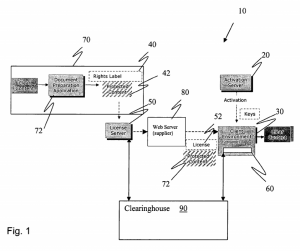 On Wednesday, July 11th, the Court of Appeals for the Federal Circuit issued a decision in Apple v. ContentGuard Holdings vacating a decision by the Patent Trial and Appeal Board (PTAB) to institute a covered business method (CBM) validity proceeding. The Federal Circuit panel of Circuit Judges Jimmie Reyna, William Bryson and Todd Hughes decided that the PTAB applied the wrong legal standard to determine if the challenged patent was subject to CBM review, citing to the standard set out by the Federal Circuit in its 2016 decision in Unwired Planet v. Google.
On Wednesday, July 11th, the Court of Appeals for the Federal Circuit issued a decision in Apple v. ContentGuard Holdings vacating a decision by the Patent Trial and Appeal Board (PTAB) to institute a covered business method (CBM) validity proceeding. The Federal Circuit panel of Circuit Judges Jimmie Reyna, William Bryson and Todd Hughes decided that the PTAB applied the wrong legal standard to determine if the challenged patent was subject to CBM review, citing to the standard set out by the Federal Circuit in its 2016 decision in Unwired Planet v. Google.
 The patent at issue in this case is U.S. Patent No. 7774280, titled System and Method for Managing Transfer of Rights Using Shared State Variables. Issued to ContentGuard in August 2010, it covers a computer-implemented method for transferring rights adapted to be associated with items from a rights supplier to a rights consumer by obtaining a set of rights associated with an item, determining whether a rights consumer is entitled to a right specified by a meta-right provided in digital form and enforceable by a repository and exercising the meta-right if the rights consumer is entitled to the specified right. The resulting invention provides an improved digital rights management (DRM) system which gives content publishers more control over transactions between downstream parties who have received content from a distributor.
The patent at issue in this case is U.S. Patent No. 7774280, titled System and Method for Managing Transfer of Rights Using Shared State Variables. Issued to ContentGuard in August 2010, it covers a computer-implemented method for transferring rights adapted to be associated with items from a rights supplier to a rights consumer by obtaining a set of rights associated with an item, determining whether a rights consumer is entitled to a right specified by a meta-right provided in digital form and enforceable by a repository and exercising the meta-right if the rights consumer is entitled to the specified right. The resulting invention provides an improved digital rights management (DRM) system which gives content publishers more control over transactions between downstream parties who have received content from a distributor.
ContentGuard asserted the ‘280 patent against Apple in a December 2013 lawsuit and then against Google in a February 2014 lawsuit; both of those cases were filed in the Eastern District of Texas. Between December 2014 and July 2015, Apple then filed a series of six petitions for validity challenges on the ‘280 patent at the PTAB including four petitions for inter partes review (IPR) proceedings and two petitions for CBM review. Google joined Apple as a petitioner on one of the CBM reviews which ended up being instituted against the ‘280 patent. In a final written decision issued in June 2016, challenged claims of the ‘280 patent were determined to be unpatentable.
Amazingly, the Federal Circuit’s vacature of the PTAB’s determination of unpatentable subject matter came after appeals from petitioners Google and Apple sent the case to the Federal Circuit. Although the panel of administrative patent judges (APJs) determined the challenged claims to be unpatentable, they also granted a motion from ContentGuard to amend claims which substituted the unpatentable claims. This appeal gave ContentGuard the ability to cross appeal the PTAB’s determination that the ‘280 patent was subject to CBM review.
Citing to Unwired Planet, the Federal Circuit noted that the PTAB’s reliance on patent claim activities which are “incidental to” or “complementary to” a financial activity to determine eligibility with CBM review was not in accordance with the law. The PTAB, in looking at claim 1 of the ‘280 patent, observed that the claimed transfer of rights between a supplier and a consumer “at the very least, is incidental or complementary to a financial activity.” The PTAB also relied on parts of the patent’s specification which discuss that the transfer of rights could involve the payment of a fee or processing by a clearinghouse.
In analyzing the ‘280 patent’s specification, the Federal Circuit panel found that the claimed invention could in fact be used in ways that did not require a financial transaction. One example cited by the appellate court involved the transfer of meta-rights from a patient to a hospital which would allow for the transfer of patient information to a second hospital where the patient may need additional treatment. Although the PTAB’s final written decision determined that the ‘280 patent claims were “financial in nature,” the Board made references to the “incidental to” or “complementary to” standard which had been struck down in Unwired Planet. The Federal Circuit remanded the case back to the PTAB and ordered the Board to determine in the first instance whether the ‘280 patent qualifies as a CBM patent in the first instance without relying on the “incidental to/complementary to” standard.
Image Source: Deposit Photos.

![[IPWatchdog Logo]](https://ipwatchdog.com/wp-content/themes/IPWatchdog%20-%202023/assets/images/temp/logo-small@2x.png)

![[[Advertisement]]](https://ipwatchdog.com/wp-content/uploads/2023/01/2021-Patent-Practice-on-Demand-1.png)
![[Advertisement]](https://ipwatchdog.com/wp-content/uploads/2024/04/Patent-Litigation-Masters-2024-sidebar-early-bird-ends-Apr-21-last-chance-700x500-1.jpg)

![[Advertisement]](https://ipwatchdog.com/wp-content/uploads/2021/12/WEBINAR-336-x-280-px.png)
![[Advertisement]](https://ipwatchdog.com/wp-content/uploads/2021/12/2021-Patent-Practice-on-Demand-recorded-Feb-2021-336-x-280.jpg)
![[Advertisement]](https://ipwatchdog.com/wp-content/uploads/2021/12/Ad-4-The-Invent-Patent-System™.png)







Join the Discussion
2 comments so far.
Sandra Grant
July 18, 2018 01:17 amI posted a comment just a few moments ago. I believe that my internet is being hacked illegally. MetroPCS confirmed that my phone was hacked several days ago. Can you confirm receipt of my comments? Northern District Court of Atlanta, case 1:13-CV-4144
Sandra Grant
July 18, 2018 01:15 amI am an innovator and I have had my phone tapped, internet hacked, home and cars broken into and storage unit to steal business plans, handwritten business designs, computers, thumb drives, and other materials of original work that I have created. Then, attempt to render me as mentally ill, poison our food and water, and threaten my kids since elementary school. I have recreated some of the stolen work and have police reports. I have been personally threatened and filed a lawsuit in federal court, Northern District Court of Atlanta 1:13-CV-4144 describing some of the unusual events. The SEC informed me that the events were similar to what they have experienced as corporate espionage. There have been attempts to create derivatives of my work. In court, I can prove when the events occurred. Can you refer a good attorney to me?